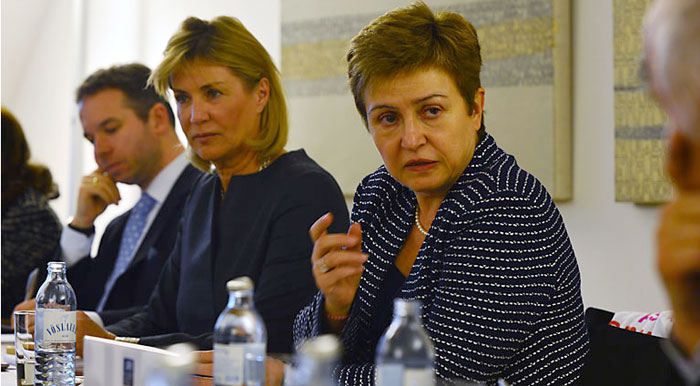
“The world may become richer, but also more fragile,” Kristalina Georgieva, European Commissioner for International Cooperation, Humanitarian Aid and Crisis Response, told a roundtable in IPI ‘s Vienna office on March 8th. Pointing to the fact that at any point in time, 40 countries of the world are entering, experiencing, or leaving a state of conflict or disaster, she said it is increasingly important to invest in communities to enable them to withstand shocks and to fortify bridges between humanitarian aid and development assistance, which has the best resources to build resilience.
“We put plasters on the wound and stop the bleeding, but we don’t cure, and cannot eliminate the underlying causes,” she explained.
The Commissioner, a Bulgarian economist who has held leading positions at the World Bank, underlined the European Union’s strong tradition and current activities in disaster response and humanitarian aid. “In the 20 years of its existence, the Commission’s European Community Humanitarian Office [ECHO], which merges humanitarian aid and civil protection, has spent over €14 billion,” she said. “The five S’s—Syria, Sahel, Sudan, South Sudan and Somalia—made 2012 a record year for our humanitarian work.”
Commissioner Georgieva stressed that the respect for humanitarian workers depends on the neutrality, independence and impartiality of humanitarian aid and that governments must resist the temptation to use it as a foreign policy tool. Looking at the crises in Mali and Syria, she emphasized the importance of the international community being on the same page.
In the question-and-answer session, participants raised issues such as how to transfer aspirations into operations on the ground; how to foster coherence among different bi- and multilateral actors; how humanitarian assistance links with security policy in asymmetric conflicts; and how access to conflict regions in times of increased threat to humanitarian workers can be assured.
Discussing the military as a third player along with humanitarian aid and civil protection, Commissioner Georgieva reviewed several scenarios of civil-military cooperation, where the military can play an important role. She also emphasized the need for increased communication between the aid communities, addressing the doubt that many humanitarian workers have that “the military might be the elephant in the china shop.”
The International Peace Institute’s HOPEFOR initiative aims to address this fear by improving military-civilian cooperation for disaster prevention and relief.
With March 8th being International Women’s Day, Ms. Georgieva noted that women and children are still the most vulnerable people in humanitarian crisis.







